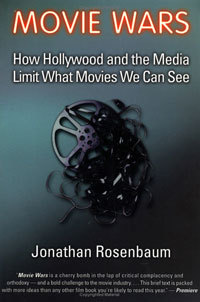미국인들이 자막 읽는 걸 싫어해서 외국영화를 안 본다는 게 사실일까? 워낙 많이들 하는 소리라 이제는 의심받지 않는 진실이 돼버린 듯하다. 필자도 미국 평론가 조너선 로젠봄의 <영화 전쟁>(Movie Wars)(사진)을 읽고 나서야 진지하게 생각해봤다. 그게 진짜 현상이라기보다 변명에 가깝다는 의견을 내세웠다. 일례로 미국 관객이 비영어 대사로 가득한 <쉰들러 리스트>와 <늑대와 춤을>, 두편의 대박영화에 나오는 자막에 대해 불평한 적이 없다는 것을 지적했다.
또한 대부분의 미국인은 자막영화를 본 적이 없다는 것도 지적했다. 보통 뭔가를 싫어하면 해보고 안 좋은 경험을 했기 때문에 그렇게 말한다. 그런데 자막의 경우 사회적인 오명을 쓴 것에 더 가깝다. 자막은 쿨하지 못하기에 사람들이 피하려 최선을 다 하는 것이다. 멜 깁슨이 만든 영화일 때만 빼고. <패션 오브 크라이스트>의 흥행 성공, 미국 관객의 부정적 반응을 유발하는 건 자막 자체라는 생각을 뒷받침하는 또 하나의 예다.
더 생각해보면 미국인들이 자막에 문제를 느끼는 것은 말이 안 된다. 요즘 미국인은 TV 앞에서보다 인터넷에서 보내는 시간이 더 많다. 젊은 세대는 텍스트를 흡수하고 조작하는 걸 감자튀김 씹는 것만큼 편하게 한다.
로젠봄이 제공하는 해석이 훨씬 그럴듯하다. 미국영화들에 대적할 수 없을 정도의 유리함을 주는 것은 할리우드 메이저 배급사가 잡고 있는 과다한 권력이며, 외국어영화가 주류 미국 관객과 교감하는 걸 막는 것은 ‘쿨 하지 못함’이라는 것이다.
할리우드 배급분야의 불균형적인 권력 분배가 금방 사라질 가능성은 적으니까 어쩌면 미국 내 외국어영화의 유일한 희망은 영화를 쿨하게 보이게 하는 것일지도 모른다. 다행히 영화들은 이미 쿨하다. <올드 보이>와 <무간도>는 할리우드의 어떤 것보다 더 앞서나가는 쿨한 것들이다. 문제는 외국영화와 자막을 둘러싼 부정적 이미지를 깨는 것이다. 작게나마 이런 일이 이미 일어나고 있는지도 모른다. 장이모 감독의 영화를 어떻게 생각하든, <영웅>이 2주 동안 북미 흥행 1위를 한 것은 가슴 뿌듯한 일이다. 이런 드문 성공도 만일 알아볼 수 있는 스타를 몇몇 만들어줄 수 있다면- 예를 들어 국제 추종자들을 이끌어낼 수 있는 장쯔이 같은 인물- 외국어영화가 젊은 관객과 통하는 데 크게 도움이 될 것이다.
그러나 젊은 세대가 외국어영화를 진정 쿨하다 느끼게 하려면 자막문제와 정면으로 맞붙어야 할 것이다. 대부분 주류 관객의 경우 자막은 “모호한”, “학구적인”, “철학적인” 그리고 “지겨운”이란 단어를 연상시킨다. 이런 인식을 바꾸는 것이 쉽지 않은 만큼 에이브 마크 노른스의 기사 “독설적인 자막 만들기를 위하여”(For an Abusive Subtitling)에 있는 제안을 받아들이는 것이 한 방법이 될 수 있다(기사는 인터넷에 있다).
노른스의 기사는 팬들이 자막을 단 버전의 일본 애니메이션에서 볼 수 있는 언어적인, 그리고 원문상의 실험에서 영감을 받은 것이다. 애니메이션 제작사가 영어자막을 제공하지 않을 경우 인터넷에 있는 팬들이 직접 대중 소비를 위한 자막을 만들곤 한다. 또한 점점 서체, 컬러, 화면에서의 위치 등을 갖고 실험하고 있다. 십대 팬들은 자막의 기존 관습에 집착할 그 어떤 충동도 느끼지 못하는 것이다.
정재은 감독의 <고양이를 부탁해>에 나오는 문자가 화면에 얼마나 창의적으로 나오는지를 떠올리면, 자막이 가질 수 있는 시각적, 미학적 가능성을 감지할 수 있다. 번역자와 그래픽 디자이너를 함께 컴퓨터 앞에 앉혀서, 화면 곳곳에 나오는 시각적으로 세련되고 눈에 띄는 자막을 만들게 한다고 상상해보라. 정신 나간 소리같이 들릴 수도 있고 대부분의 영화사는 이런 전략을 고려하기엔 너무나도 보수적이긴 하지만, 이것이 어쩌면 MTV 세대에게 외국영화를 쿨하다고 느끼게 할 수 있는 가장 효과적인 방법이 될지도 모른다.
Americans and the subtitle problem
Is it really true that Americans don't watch foreign films because they don't like reading subtitles? We hear people say this so often that it has become an unquestioned truth. I myself only really stopped to think about it seriously when I read the book Movie Wars by American critic Jonathan Rosenbaum, who argued that it was more of an excuse than a real phenomenon. Among other things, he pointed out that U.S. audiences never compained about the subtitles in Schindler's List or Dances With Wolves, two major box-office hits that were filled with non-English dialogue.
He also noted that most Americans have never seen a film with subtitles. Usually, when we say we don't like something, it is because we have tried it and had a bad experience. With subtitles, it's more like a societal stigma. Subtitles are uncool, and so people do their best to avoid them. Except if the film is made by Mel Gibson... The box-office success of The Passion of the Christ is another rejoinder to the idea that it is the subtitles themselves that U.S. audiences are reacting against.
Upon further thought, it doesn't make any sense that Americans should have problems with subtitles. The average American now spends more time on the internet than in front of the TV. Young generations are as comfortable absorbing and manipulating text as they are chewing on french fries.
Far more likely is the explanation provided by Rosenbaum - that it is the excessive power held by the major Hollywood distributors that gives US films an insurmountable advantage - and the problem of being 'uncool' that keeps foreign language films from connecting with mainstream American audiences. The imbalanced allotment of power in Hollywood's distribution sector is unlikely to go away soon, so perhaps the only hope for foreign language films in the U.S. is to find a way to make them cool. Luckily, the films themselves are already cool - Old Boy and Infernal Affairs are far more hip than anything Hollywood produces - the problem is to break the negative image surrounding foreign films and subtitles.
In a small way, this may already be happening. Seeing Hero spend two weeks at #1 at the North American box-office was a heartwarming sight, regardless of what you may think of Zhang Yimou's film. If these rare successes can create some recognizable stars - such as Zhang Ziyi, who probably has the potential to acquire a major international fan following - then that would go a long way to making foreign-language films connect with younger audiences.
But to make foreign-language films genuinely cool for younger generations, the subtitle problem will probably have to be tackled head on. For most mainstream viewers, subtitles are associated with words like "obscure," "academic," "philosophical" and "boring." Changing these perceptions won't be easy, which is why it might make sense to take up the suggestions of Abe Mark Nornes in his article "For an Abusive Subtitling" (search for it on the internet).
Nornes' article is inspired by the linguistic and textual experimentation that appears in "fan-subbed" versions of Japanese anime. When the companies that produce these films don't provide English subtitles, fans on the internet create their own subtitles for public consumption. Increasingly they have also been experimenting with fonts, colors, and the placement of the text on the screen. Teenage fans feel no compulsion to stick to the established conventions of subtitling.
Think of the creative way that text appears on the screen in Jeong Jae-eun's Take Care of My Cat, and you get an idea of the visual and aesthetic possibilities for subtitles. Imagine sitting a translator and a graphic designer down together in front of a computer to create visually polished, eye-catching subtitles that appear in various parts of the screen. It may sound crazy, and most film companies are far too conservative to ever consider such a strategy, but this might turn out to be the most effective way to make foreign films cool for the MTV generation.


